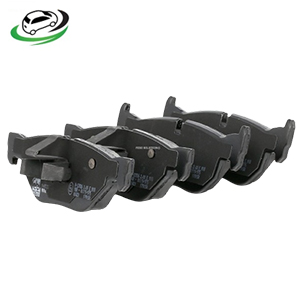-12%
Get BMW X1-E84 Rear Brake Pad Sensor 3145270024
Brake pad sensors are small electronic components integrated into a vehicle’s braking system to monitor the condition of the brake pads. These sensors offer several benefits and provide valuable indications when the brake pads require replacement. Understanding the benefits of brake pad sensors and recognizing signs of their need for replacement is crucial for maintaining optimal braking performance and ensuring vehicle safety.
Benefits of Brake Pad Sensors:
- Early Warning System: Brake pad sensors serve as an early warning system by detecting the wear of the brake pads before it becomes critical. They provide timely alerts to the driver, allowing for proactive maintenance and replacement of the brake pads before they wear out completely.
- Prevention of Brake Damage: By alerting the driver to worn brake pads, sensors help prevent damage to other brake components, such as the brake rotors. Timely replacement of worn brake pads minimizes the risk of metal-to-metal contact between the brake pads and rotors, which can cause significant damage and necessitate costly repairs.
- Enhanced Safety: Perhaps the most significant benefit of brake pad sensors is their contribution to vehicle safety. By ensuring that the brake pads are replaced before they reach critical levels of wear, sensors help maintain optimal braking performance, reducing the risk of accidents and collisions on the road.
- Convenience: Brake pad sensors simplify the process of monitoring brake pad wear for drivers. Instead of relying solely on visual inspections or scheduled maintenance intervals, drivers receive automatic alerts when the brake pads need replacement, making it easier to stay on top of brake maintenance.
- Improved Maintenance Planning: Brake pad sensors facilitate better maintenance planning by providing accurate information about the condition of the brake pads. This allows drivers and service technicians to schedule brake pad replacement at the most convenient time, minimizing downtime and inconvenience.
- Extended Component Life: By preventing premature wear and damage to the brake system, brake pad sensors contribute to the extended lifespan of brake components. Regular replacement of worn brake pads helps preserve the integrity of other braking system components, such as calipers and brake lines.
- Cost Savings: While brake pad sensors themselves are a relatively small investment, they can help save drivers money in the long run by preventing expensive repairs and replacements resulting from neglected brake maintenance. By replacing brake pads in a timely manner, drivers can avoid costly damage to other brake components and maintain optimal vehicle performance.
Signs a Car Needs New Brake Pad Sensors:
- Dashboard Warning Light: Most modern vehicles equipped with brake pad sensors feature a dashboard warning light that illuminates when the brake pads wear beyond a certain threshold. If the brake pad warning light is illuminated, it indicates that the brake pads or sensors require attention and possibly replacement.
- Absent or Inoperative Warning Light: If the dashboard warning light for brake pad wear remains illuminated even after the brake pads have been replaced, it may indicate a malfunctioning brake pad sensor. In such cases, the sensor should be inspected and replaced if necessary to ensure accurate monitoring of brake pad wear.
- Unreliable Brake Pad Wear Alerts: If the brake pad sensor fails to provide timely or accurate alerts about brake pad wear, it may indicate a faulty sensor that requires replacement. Inconsistent or unreliable warnings can compromise the effectiveness of the brake pad monitoring system, potentially leading to safety risks.
- Visible Damage or Corrosion: Physical damage or corrosion on the surface of the brake pad sensor can affect its functionality and reliability. Inspecting the sensor during routine maintenance or brake pad replacement can help identify any signs of damage or corrosion that warrant replacement.
- Diagnostic Trouble Codes (DTCs): In some cases, a malfunctioning brake pad sensor may trigger diagnostic trouble codes (DTCs) in the vehicle’s onboard diagnostic system. These codes can be retrieved using a diagnostic scanner and indicate specific issues with the brake pad sensor that require attention.
- Age or Mileage Considerations: Over time, brake pad sensors may deteriorate due to exposure to heat, moisture, and other environmental factors. As part of routine maintenance, it’s advisable to inspect brake pad sensors periodically and replace them as needed, especially in older vehicles or those with high mileage.
- Loss of Brake Pad Monitoring Functionality: If the vehicle’s brake pad monitoring system becomes inoperative or unreliable, it may be due to a malfunctioning brake pad sensor. Loss of monitoring functionality compromises the ability to detect worn brake pads, increasing the risk of driving with insufficient brake pad material.
Follow us on Facebook For more parts.



